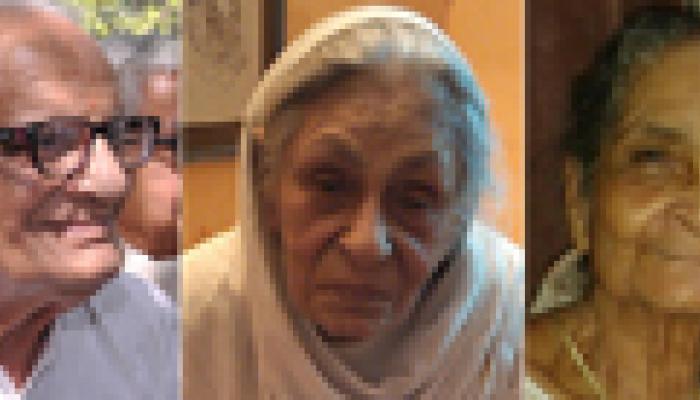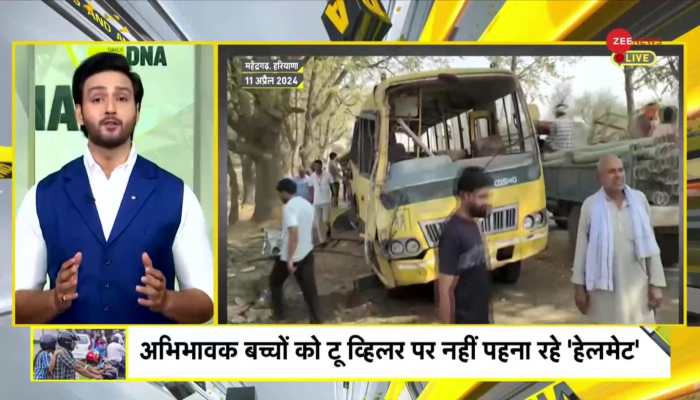Rewind: Tales from India’s freedom struggle
There`s always a part in history which remains unwritten and unspoken, yet its contribution to the making of an historical event is like little drops in a mighty ocean.
Trending Photos
)
 There`s always a part in history which remains unwritten and unspoken, yet its contribution to the making of an historical event is like little drops in a mighty ocean. My quest to unravel more history related to India’s freedom struggle led me to the doorsteps of a few nonagenarians who were ‘there’ when it all happened. True, they are no Gandhi, Nehru, Subhash or Tagore, but the insurmountable valour and patriotism these men displayed during India’s freedom struggle still finds resonance in their quivering yet strong voice. 91-year-old JG Sukheja was the first one I met in connection with my story. Sukheja had just settled down on a bench after finishing a round of chat with his friends in the neighbourhood park. “So sir which part of India were you born in?” I asked. “I was born in British India which was yet to be demarcated as the present Pakistan,” he replied. Sukheja was born in Multan in a well-heeled family. He was under 10 when legendary Bhagat Singh was executed. As a child, he had heard stories of Bhagat Singh’s bravado and gradually found a hero in him. When Singh was hanged there were massive protests across the country. Sukheja, who was forbidden by his family to move out of the house, secretly participated in the protest and shouted slogans against the British Empire. At such a tender age, he received several bruises on his back and limbs when the protesters were mercilessly lathi-charged by the English officers. ‘I still have some unpleasant memories of 1947 exodus. India was granted Independence but at a heavy cost - partition. One day I heard speeches of Nehru and Gandhi wherein they appealed to all to help their fellow countrymen during such a crucial time. Since my family used to run a flour mill in Multan, I set up a free flour and rice distribution camp at the border for those fleeing from the other side to India. Nehru had asked me to take some money, but I refused and offered my service free of cost for the sake of humanity. However, when the situation turned graver, we too were forced to abandon our ancestral property in Multan and head to India,” he said with despair.
There`s always a part in history which remains unwritten and unspoken, yet its contribution to the making of an historical event is like little drops in a mighty ocean. My quest to unravel more history related to India’s freedom struggle led me to the doorsteps of a few nonagenarians who were ‘there’ when it all happened. True, they are no Gandhi, Nehru, Subhash or Tagore, but the insurmountable valour and patriotism these men displayed during India’s freedom struggle still finds resonance in their quivering yet strong voice. 91-year-old JG Sukheja was the first one I met in connection with my story. Sukheja had just settled down on a bench after finishing a round of chat with his friends in the neighbourhood park. “So sir which part of India were you born in?” I asked. “I was born in British India which was yet to be demarcated as the present Pakistan,” he replied. Sukheja was born in Multan in a well-heeled family. He was under 10 when legendary Bhagat Singh was executed. As a child, he had heard stories of Bhagat Singh’s bravado and gradually found a hero in him. When Singh was hanged there were massive protests across the country. Sukheja, who was forbidden by his family to move out of the house, secretly participated in the protest and shouted slogans against the British Empire. At such a tender age, he received several bruises on his back and limbs when the protesters were mercilessly lathi-charged by the English officers. ‘I still have some unpleasant memories of 1947 exodus. India was granted Independence but at a heavy cost - partition. One day I heard speeches of Nehru and Gandhi wherein they appealed to all to help their fellow countrymen during such a crucial time. Since my family used to run a flour mill in Multan, I set up a free flour and rice distribution camp at the border for those fleeing from the other side to India. Nehru had asked me to take some money, but I refused and offered my service free of cost for the sake of humanity. However, when the situation turned graver, we too were forced to abandon our ancestral property in Multan and head to India,” he said with despair.  But unlike men, many women – though equally committed to the cause - lacked the liberty to set aside household chores and take active part in the freedom struggle. Kaneez Haider (90) was one among those very few women, who despite struggling for their own liberation, did their bit to liberate India. ‘In our culture, we girls, in those days, were not allowed to leave the house without a burkha. However, the freedom wave was such that I couldn’t confine myself inside the four walls of my house,’ said Kaneez. Enrobed in cotton salwar kameez and partially covering her head with a crumpled dupatta, Kaneez spiritedly got up from her bed when told by her son that someone wants to know her account of the freedom struggle. ‘It rejuvenates me whenever someone touches the topic of India’s Independence to me,’ she grinned as I sat close to her. Kaneez vaguely remembers her age when she began listening to stories of Englishmen’s brutality towards Indians. “I developed hatred for them as I often saw them humiliating and beating our people. My mother was initially not in favour of my participating in the freedom movement, but for my father religious sentiments were secondary in front of the will to free India from British rule. I along with a few friends used to collect Muharram and Eid funds from our community and give it to the workers of revolutionary parties,” she recalled. Kaneez, who hails from Allahabad, cherishes the old times when she and her Hindu neighbours used to celebrate Eid and Diwali together. “That was the time when it was difficult to differentiate Hindu from Muslim and vice versa. These British succeeded in dividing two harmonious communities. As India’s Independence was inching closer, there was apprehension among people as to what will happen afterwards. The `learned lot` rued that there would be inflation and poverty everywhere. Despite this fear, nobody wanted the British to continue. Everyone wanted to be ruled by their own elected government,” she said. On the day Jawaharlal Nehru declared India’s Independence, Kaneez along with her neighbours burnt crackers, sang patriotic and folk songs and lit umpteen lamps in the neighbourhood. Post Independence, she worked under Indira Gandhi to educate people on the importance of voting. “Indiraji gave us khadi sarees which we wore beneath our burkha. After seeking permission from my parents, I went door to door to explain illiterate people about the use of ballot paper. The Indian National Congress then had a pair of ox ploughing a field as its election symbol. The day Nehruji became first Prime Minister of India, a sumptuous feast was organised at Anand Bhawan. Indiraji personally arranged for a chauffeur to drop us girls back home. The feeling to have our own government in our country was ineffable and that scrumptious feast still relishes my taste buds,’ said Kaneez.
But unlike men, many women – though equally committed to the cause - lacked the liberty to set aside household chores and take active part in the freedom struggle. Kaneez Haider (90) was one among those very few women, who despite struggling for their own liberation, did their bit to liberate India. ‘In our culture, we girls, in those days, were not allowed to leave the house without a burkha. However, the freedom wave was such that I couldn’t confine myself inside the four walls of my house,’ said Kaneez. Enrobed in cotton salwar kameez and partially covering her head with a crumpled dupatta, Kaneez spiritedly got up from her bed when told by her son that someone wants to know her account of the freedom struggle. ‘It rejuvenates me whenever someone touches the topic of India’s Independence to me,’ she grinned as I sat close to her. Kaneez vaguely remembers her age when she began listening to stories of Englishmen’s brutality towards Indians. “I developed hatred for them as I often saw them humiliating and beating our people. My mother was initially not in favour of my participating in the freedom movement, but for my father religious sentiments were secondary in front of the will to free India from British rule. I along with a few friends used to collect Muharram and Eid funds from our community and give it to the workers of revolutionary parties,” she recalled. Kaneez, who hails from Allahabad, cherishes the old times when she and her Hindu neighbours used to celebrate Eid and Diwali together. “That was the time when it was difficult to differentiate Hindu from Muslim and vice versa. These British succeeded in dividing two harmonious communities. As India’s Independence was inching closer, there was apprehension among people as to what will happen afterwards. The `learned lot` rued that there would be inflation and poverty everywhere. Despite this fear, nobody wanted the British to continue. Everyone wanted to be ruled by their own elected government,” she said. On the day Jawaharlal Nehru declared India’s Independence, Kaneez along with her neighbours burnt crackers, sang patriotic and folk songs and lit umpteen lamps in the neighbourhood. Post Independence, she worked under Indira Gandhi to educate people on the importance of voting. “Indiraji gave us khadi sarees which we wore beneath our burkha. After seeking permission from my parents, I went door to door to explain illiterate people about the use of ballot paper. The Indian National Congress then had a pair of ox ploughing a field as its election symbol. The day Nehruji became first Prime Minister of India, a sumptuous feast was organised at Anand Bhawan. Indiraji personally arranged for a chauffeur to drop us girls back home. The feeling to have our own government in our country was ineffable and that scrumptious feast still relishes my taste buds,’ said Kaneez.  Like Sukheja and Kaneez, Kanak Prabha has seen it all in her 90 years. Born in the cradle of India`s freedom struggle, Bengal, the devotee of Goddess Durga had fought with all her might against the British. After offering me some home cooked Bengali sweets, Kanak showed me an old picture of her while making herself comfortable on a bamboo chair. ‘As a child I was the mischievous one among all my siblings. I often wished to turn into Durga and run behind those Goras (English officers) with my trident,’ she said. Kanak had attended some public speeches of Subhash Chandra Bose when she was a young girl. Although her father wanted her to pursue classical singing and settle down with a suitable match, she had something else in mind. Prabha always wanted to march on the road with an Indian National flag, protesting against the British Empire. ‘I was a little rebellious kind. My father had given strict instructions to all the children to stay away from the political hubbub in the country. However, he couldn’t hold my patriotic reins. I and my friend used to steal chapattis from our homes and secretly give them to the workers in Bose’s team. Once, my friend’s father saw this and duly told my father. He was furious and slapped me for not obeying his orders. But, this could hardly refrain us as we were a little defiant,’ she added, smiling mischievously. As a young girl, Kanak Prabha participated in various demonstrations, carried out by many nationalists in Calcutta. ‘While the protests were on, we the younger lot, used to compete as to who would shout the slogan loudest against the British. There was no fear of being beaten,’ she said. Three different people in three different corners of the country but with one dream – free India! I could read it in their moist eyes: “Mujhe bhi yaad rakhna jab likho tareekh-e-wafa ke maine bhi lutaya hai mohabbat mein sakoon apna”
Like Sukheja and Kaneez, Kanak Prabha has seen it all in her 90 years. Born in the cradle of India`s freedom struggle, Bengal, the devotee of Goddess Durga had fought with all her might against the British. After offering me some home cooked Bengali sweets, Kanak showed me an old picture of her while making herself comfortable on a bamboo chair. ‘As a child I was the mischievous one among all my siblings. I often wished to turn into Durga and run behind those Goras (English officers) with my trident,’ she said. Kanak had attended some public speeches of Subhash Chandra Bose when she was a young girl. Although her father wanted her to pursue classical singing and settle down with a suitable match, she had something else in mind. Prabha always wanted to march on the road with an Indian National flag, protesting against the British Empire. ‘I was a little rebellious kind. My father had given strict instructions to all the children to stay away from the political hubbub in the country. However, he couldn’t hold my patriotic reins. I and my friend used to steal chapattis from our homes and secretly give them to the workers in Bose’s team. Once, my friend’s father saw this and duly told my father. He was furious and slapped me for not obeying his orders. But, this could hardly refrain us as we were a little defiant,’ she added, smiling mischievously. As a young girl, Kanak Prabha participated in various demonstrations, carried out by many nationalists in Calcutta. ‘While the protests were on, we the younger lot, used to compete as to who would shout the slogan loudest against the British. There was no fear of being beaten,’ she said. Three different people in three different corners of the country but with one dream – free India! I could read it in their moist eyes: “Mujhe bhi yaad rakhna jab likho tareekh-e-wafa ke maine bhi lutaya hai mohabbat mein sakoon apna”







)
)
)
)
)
)
)
)
)
)
